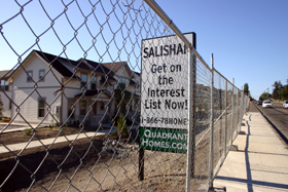City leaders are considering recommendations for development of the Portland Avenue neighborhood in the hopes of drawing new businesses and residents, according to a July 19 meeting of the Tacoma City Council Economic Development Committee.
There is a lot of entrepreneurial energy in the Portland Avenue area, said Mike Gleason of ECO Northwest, a consulting firm hired by the city to examine and evaluate development opportunities in this area located in the east part of the city. It will take the city to be the catalyst for development, or it wont happen.
Indeed, according to Gleason and Terry Moore, a vice president of ECO Northwest, limited resources from city staff have hindered development in the area for the past two decades.
A lot of political capital and energy from the city will be required, added Gleason, who suggested turning the area into an incubator for redevelopment — where the city would work with business owners to facilitate change, rather than stepping into the neighborhood and implementing its own policy.
Gleason and Moore shared their findings in a report entitled The Portland Avenue Economic Evaluation — which presents opportunities and obstacles for development, a vision for the neighborhoods future, and recommended steps to achieve that vision.
Key opportunities for the area include its proximity to downtown and the Port of Tacoma, underutilized land near Interstate 5, and the Puyallup Tribes plan to expand its casino. The study also cited existing social systems for communication and cooperation, as well as community sentiment in favor of development.
Disadvantages include poor streetscapes, lack of amenities, physical barriers to surrounding neighborhoods (particularly for pedestrians), poor quality housing stock, and vacancies in residential and commercial units, according to the report.
There is going to be change in the neighborhood, said Moore. Theres already a lot of change happening. But Moore and Gleason explained that much of that change would be a fractured smattering of development.
One example is the Puyallup Tribes plan to expand its casino operations. Gleason predicted that such an expansion, though welcomed in Tacoma, would likely be introspective, with retail stores, restaurants and a hotel located inside the casino. Everything outside the casino remains undeveloped, Gleason commented.
That said, Gleason recommended the city create a formally organized partnership of city staffers, business owners, and private developers with a shared vision.
The group is going to have to create a strategic plan around the concept of what they want to do, said Gleason.
The studys major development vision calls for an internationally-themed restaurant or grocery store near Interstate 5 to encourage other businesses to locate nearby. The plan also calls for high-density multi-family housing along Portland Avenue, and mixed-use developments near the interstate. Additional on-street parking would be needed in order to accommodate increased population and shoppers.
In addition to creating a formally organized partnership, the study also recommends the city take the following action in order to promote redevelopment: continue current residential programs; target outreach regarding existing commercial development programs; monitor construction activities of the Washington State Department of Transportation (specifically campaigning for designs that favor neighborhood development).
The study also recommends several actions for property owners and private developers, such as developing and participating in strategic relationships, and expand existing businesses.
Tacoma is clearly out of decline, said Moore. When you start to get growth pressure, youre going to get infill and redevelopment in this area. Its a natural — and such an opportunity.
Councilmember Bill Evans said he liked the idea of creating an incubator with public and private partnership.
A lot of us have seen the potential in this neighborhood for a decade or so, said Councilmember Rick Talbert. We can have all the greatest ideas in the world, but if theyre not what the community needs, they wont work.








